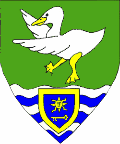
My page with Finnvarr's writing said this for years:
Chronique.com is the original host of The Dialogue of Chivalry. The site has many articles and links.2013 note: The links to that "original" repository are't good now, but I replaced them with Wayback Machine links. Then there's mine here (also accessible by clicking the image above or the title of this page) and one on the Midrealm's site (below).
There is a review on another site that was stirred up by a facebook discussion among members of The Order of the Pelican in 2013, and I bring it here both by link and text, in case that site disappears, too.
Dialogue of Chivalry of Duke Finnvarr de Taahe, by Etienne de l’Isle, on a site called Conservative Book Talk, review published on November 20, 2008.I don't know who wrote that, as the blog was moved, with a note in the intro that some of the authorship notes had been lost. Because of the interesting fact that he or she took it to be a historical document, it might be best to leave it anonymous.This is one of those times when I fall in love with the internet all over again. I wandered onto this great website, and found a typed version of this 12th century “dialogue.” It should be a must-read for all history majors at college. I learned a lot about chivalry and the 12th century in general; most of the following I learned by reading this 19-page work.STORY: A recounting of an evening spent in the hospitality of the Duke Finnvarr de Taahe. This being the 12th century, the Duke and his fellow peers are peers by virtue of personal merit/selection by a committee of other peers and the king (not, as most people now understand it, by ancestry). These educated elite gather in one another’s homes and at tournaments to have fun and take pleasure in educating themselves. The evening, as recorded by a scribe of de Taahe’s entourage, is unusual in that the peers spent all night talking about the problems of their society and ways to fix them. Most of their concerns are about the knights and peers who are supposed to set the example for society; pride, trying to appear all-knowing instead of knowledgeable, arrogance, over-competitiveness, and putting appearances over substance. Most of which sound like modern social problems.
BAD: Well, being a typed version, there are a few adjustments of translation. I don’t know if this was originally in Olde English or Latin or even French, but the transliterator mixes a few modern colloquialisms, so certain points of accuracy could be in question. Otherwise, nothing else objectionable. However, some parts may be confusing for the un-medieval-Europe-literate; especially since no background information is given for the characters or even the placement of their story into a particular era or country. I figured it out from reading other works (“The Troubador’s Song”, and especially “Henry II”). If anyone has more specific research on this work, please enlighten me, but my estimation is that these are Irish people (or possibly Britons, from Brittany aka France), 12th century, and they’re talking when King Henry the Younger (III) is reigning (possibly his brother Richard aka the Lionheart: it’s hard to tell as their reigns were intertwined).
GOOD: What I loved about this “book” was how closely related the “modern” problems of today and the “modern” problems of the 12th century are. Its easy to forget, when reading history, that at any given point in time, what was happening was “modern” to the people living through it. It seemed like the high point in history, and the low point in culture, for just about every generation. Considering how this election went, it’s a comforting thought that humanity has survived poor leadership before, and will continue to do so for a while yet. This “book” is extremely quotable, with dozens of good stories and examples of proper “gentle” behavior, bad form in manners, and ways that people can recover from the latter and regain honor lost in the heat of the moment. Despite my delight in the similarities of modernity, I must note that the discretion of wording is impressive. No ad hominem (personal) attacks, only examples of poor behavior with the names omitted. No curse words or discussions of lust, torture, or other disgusting things, even when their occurrence is implied. And the ladies are not kept out of the discussion, but they don’t dominate it either (ironicly, for a discussion on chivalry, it was the example of true compatability by the females that most impressed me).
OVERALL: highly recommended. If you enjoy reading history, this will give you a fresh perspective (I recommend reading through W. L. Warren’s “Henry II”, which is about the previous century, for background information on where all these chivalric ideals fit into the big picture).
I especially like "I must note that the discretion of wording is impressive. No ad hominem (personal) attacks, only examples of poor behavior with the names omitted," as that's a rule from the philosophy discussions I ran for many years, and which Finnvarr stipulated in the setup for the (fictional) discussion: "Let us name no names and make no attacks..."
From the announcement for the first "philosophy practice" I ever ran, in 1989: "Keep arguments philosophical and hypothetical (when possible) and not personal or particular." Discussion Group at AElflaed's (or AElflaed's Vigil) And a note at the same link, from 1991 after I had run several such sessions: "Don't let the discussions become attacks on individuals. If enough people know who you're talking about, even if you haven't named names, either drop it or pull back and discuss it in more general terms."
I like seeing that someone in 2008 commended those 12th century folk on being so courteous.
While he (or she) could have googled "Duke Finnvarr de Taahe" or "Ealdormere" or other terms or names and found the provenance of the writing (or just examined the copyright notice a little more closely), it's quite interesting that he was wondering instead whether it was "originally in Olde English or Latin or even French." Good that the "few modern colloquialisms" were noted.
The text of The Dialogue of Chivalry is preserved on Medieval E-resources: http://www.midrealm.org/midrealm_dialogue_of_chivalry.html. The address given to contact the author might not be good after 2013.
The author of The Dialogue of Chivalry hath a blog:
Muhlberger's World History Ancient, medieval, Islamic and world history—comments, resources and discussion.
